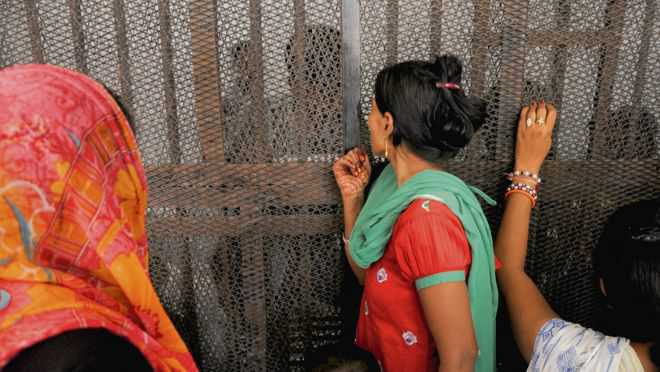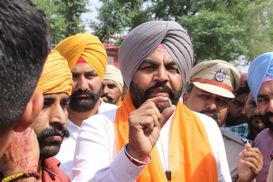
Mulaqat: The system is inadequate as family members often meet the prisoners in a congested and crowded atmosphere.
GS Bajpai
Professor, National Law University, New Delhi
Conjugal visits are again in the news with a petition in a Delhi court pushing this debate to yet another level. Prisons are single-sex institutions, resulting in the norm of suppressed sexual desires. Confinement in prison deprives prisoners of an active sexual life, culminating into a search for alternative ways. In a conjugal visit, an inmate is allowed to spend time with the legal spouse. Therefore, it has been construed as a possible and partial solution to save the prisoners from sexual frustration and encourage indulgence in procreation activities.
The Punjab and Haryana High Court has ruled that procreation or alternatively artificial insemination continues to be a right of the incarcerated person. Several cases have now come up before the courts where sexual engagement and procreation have been raised as a ground for suspension of sentence or parole. Primarily, however, the idea of conjugal visits emerged as a solution to problematic sex lives of prisoners.
By and large, the prison administrations are ill prepared and ill equipped to manage this issue effectively. Consequently, they enforce a regulatory control aimed at suppressing the innate urges of prisoners. Even the current system of mulaqat is inadequate, given that the family members often meet the prisoners in a congested and crowded atmosphere.
Prisons are mysterious places. They remain scarcely studied as institutions and not much is known about the life and challenges faced by the inmates inside. Rose Giallombardo’s research finds that there is a natural tolerance of sexual perversions in the prison community. According to Donald Clemmer, on account of the atypical prison culture which justifies negative modes of adaptations and behaviour, a prison may be termed as an ‘abnormal community’.
Perhaps, the only study on this subject in India was conducted by a noted criminologist, Prof SP Srivastava, who observed that the prisoners, driven by sexual urges, try to cope with them in a myriad of ways. Some common methods are to indulge in sexual talks and fantasies and sexually-loaded jokes are quite prevalent. However, the most rampant are: (i) Nocturnal sex dreams (ii) Self-masturbation and (iii) Homosexuality. This study suggested that a large number of prisoners (53 per cent) admitted that they frequently have sex dreams. This mode of sexual gratification (mainly the discharge of seminal energy) is considered by an even greater majority of prisoners (79 per cent) as ‘normal’ in the prison milieu. Masturbation is also common and depends on the situations and opportunities as the prisons are generally very crowded.
A study reported in the Journal of Medical Research article in 2010 quoted figures from the Arthur Road jail in Mumbai in which 72 per cent of the inmates interviewed said sex between men was quite common. About 11 per cent admitted to have had sex with other men. In this context, the People’s Union of Civil Liberties has observed: “When a young boy enters, the prisoners have been known to have bid a price for the boy. The price offered is in terms of bidis, soap or charas. Often, prisoners have been divided into camps and the groups have fought each other on the issue of who shall have the new entrant.”
It is also pertinent to note here that there is enough evidence to suggest that the population of HIV/AIDS- infected prisoners is consistently increasing. A resolution of sexual frustrations in prisons could be a major solution to this issue. Available data reveals that the extent of homosexuality in prisons range between 10 and 30 per cent. Despite the recent judgment decriminalising homosexuality between consenting partners, the prisons seem to display a tough authoritarian reaction to this behavior, signifying that not much has changed for homosexuals in prisons. The contour of homosexuality in prisons is different from the world outside. In the outside world, homosexuality is a choice. However, inside a prison, this behaviour is driven by the no-choice compulsion. The emerging debate in the light of decriminalisation of Section 377 is in terms of what stand the prisons in India need to take on this — should it be allowed or be regulated.
It is against this backdrop that conjugal visits are being considered as a possible solution to reform the prison subculture which drives the prisoners to adapt negatively to stressful situations. At present, there are no formal or legal arrangements to facilitate such conjugal visits even though the courts have time and again directed the state governments to make such arrangements.
In January 2010, while hearing a PIL on treatment facilities for HIV-positive prison inmates, the Bombay High Court directed the Maharashtra government to examine the possibility of allowing jail inmates to engage sexually with their wives in privacy within the jail premises. Justice Majumdar in this regard observed: “There may be physical needs. See whether a separate place can be given to a prisoner and his wife for a day or two. The government is spending crores of rupees to curb the AIDS menace in jails. Instead, why don't you take preventive steps?”
In January 2018, the Madras High Court granted a two-week leave to a prisoner sentenced with life imprisonment for assisting his wife with her infertility treatment. It recounted the merits of the conjugal visits and raised conjugal visits to the status of being a facet of the right to dignity. It further opined that the same could lead to a reduction in “frustration, tension, the ill feelings and the heartburning.”
It can be deduced from the above that despite an absence of legal provisions, the approach of the courts has been to allow such visits. A conjugal visit is considered to be a right of a prisoner. It has a potential to not only reform individual prisoner but also to contribute to the improvement in the prison culture in general. The need, therefore, is to institutionalise conjugal visits by amending the prison manual and by creating a scheme based upon the eligibility and identification of prisoners, among other aspects.


























